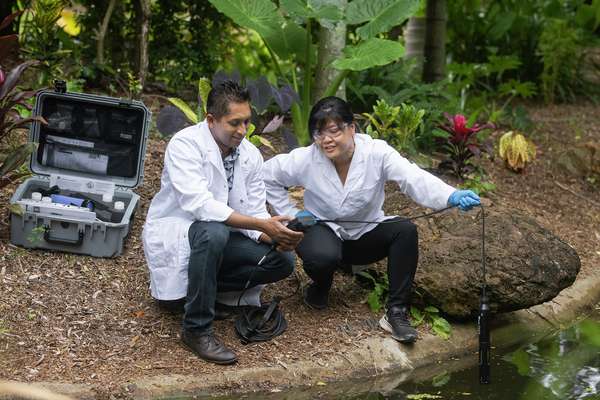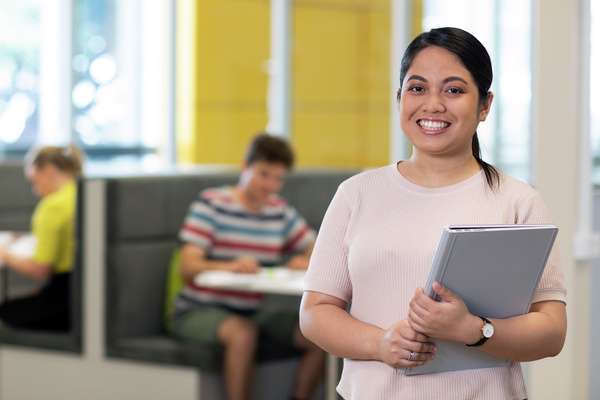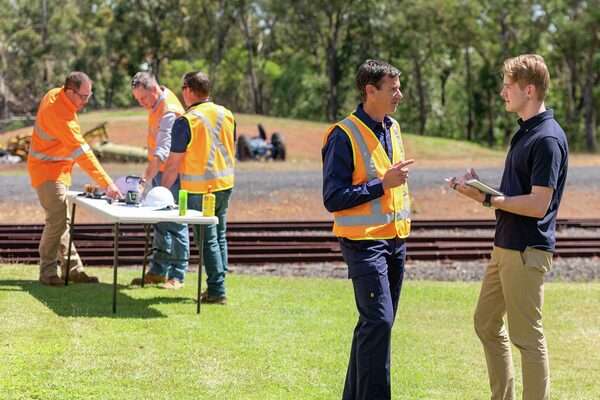These documents demonstrate our commitment to sustainability and the United Nation’s Sustainable Development Goals (SDGs). The following information highlights the key activities as outlined in the 2024 reports that align with each of the Sustainable Development Goals. Our culture of sustainability is underpinned by the commitment to the 17 Sustainable Development Goals, which informs the sustainable impact agenda for a better global future.
In 2024, CQU provided over $3 million in urgent financial relief and scholarships to over 2000 domestic students identified as being from lower socioeconomic backgrounds.
Throughout 2024, over 180 staff supported the CQUniCares fund through regular workplace giving and one‑off contributions valued at over $50 000. The CQUniversity Annual Appeal raised more than $26 000 to benefit student scholarships, sea ranger training, and equipment and education for the U-BEACH project.
CQUniversity continues to support the Delhi-based Salaam Baalak Trust, providing educational and cost-of-living expenses to these former street children of India.
Through the Fight Food Waste Cooperative Research Centre, CQUniversity researchers are undertaking research and delivering programs that may save Australian households money by reducing food waste.
The Fresh Food Pantry Project has been launched as a pilot initiative on CQUniversity’s Melbourne and Sydney campuses, which support a community of nearly 5000 international students.
The project features regular pop-up stalls across Term 2 and 3, and students can register to stock up for free on culturally-appropriate fresh fruit and vegetables.
The following initiatives are outlined in the 2024 Annual Report and provide insight into the University’s commitment to Good Health and Wellbeing for students, staff, and communities.
As a leader in higher education, our approach to teaching and education aligns with the themes of the United Nations Sustainable Development Goal (SDG) 4: Quality Education.
The following initiatives are outlined in the 2024 Annual Report and provide insight into the University’s commitment to providing quality education:
Aligned with the United Nation’s Sustainable Development Goal 05: Gender Equality, our university is committed to ensuring the workplace provides equal opportunities for all employees.
Gender Equality for Staff
CQUniversity is proud to demonstrate gender equality across our workforce, with women well represented at every level of the organisation. Women make up 54.4% of academic staff, 73.7% of professional staff, 64.4% of research staff, and 52.2% of VET educator staff. Overall, 64.8% of CQUniversity staff are female, reflecting our commitment to building a diverse, inclusive, and equitable workplace where women thrive in teaching, research, leadership, and professional roles.
Gender Equality for Students
CQUniversity also promotes gender equality within our student community, with women comprising 59.2% of the total student body in 2024. To ensure women are equally represented across all fields, we actively support female participation in traditionally underrepresented areas such as STEM, agriculture, and trades through a range of targeted programs and initiatives, including:
Find out more about gender equity programs and mentoring we have available.
Aligned with the United Nation’s Sustainable Development Goal 06: Clean Water and Sanitation, our Sustainability Projects Report card for SDG 6 outlines the University's progress on key projects.
Highlights in 2024 include:
Aligned with the United Nation’s Sustainable Development Goal 7: Affordable and Clean Energy, our Sustainability Projects Report card for SDG 7 outlines the University's progress on key projects related to this SDG.
Highlights from 2024 include:
Aligned to the themes of the United Nations Sustainable Development Goal (SDG) 8: Decent Work and Economic Growth, CQUniversity demonstrates commitment through its staff, students and research.
Investment in infrastructure is important to achieving sustainable development and empowering communities. This work is key for aligning with the Sustainable Development Goal 09: Industry, Innovation and Infrastructure.
Highlights and achievements in 2024 include:
Innovative companies have been created, either university-controlled entities or non-controlled entities, these entities include:
MASK-ED™ (KRS simulation) is a high-fidelity simulation technique which is informed by a teach process and involves realistic body silicone props work by an educator to create a new identity for simulation teaching.
A major achievement in 2023 was the successful licensing of the mango auto‑harvester and crop load estimator technology to a commercial partner Agricultural Robotics, for commercial development and deployment. As part of this licensing, Agricultural Robotics have been successful in gaining the Federal Government’s Accelerating Commercialisation Grant. The project also won first prize at the Croc Pitch event as part of the Developing Northern Australia Conference, gaining access to $1 million in venture capital.
We believe that education is for all, and we actively promote opportunity and inclusiveness for students through our courses, support services and innovations.
Highlights from 2024 include:
Aligning with the United Nations Sustainable Development (SDG) 11: Sustainable Cities and Communities, our focus on social innovation continued throughout 2024. Our university embodies a purposeful commitment to the sustainability of its communities socially, environmentally and economically by producing new knowledge and global leaders who deliver innovative, solutions-focused outcomes and drive change to address real-world challenges.
Programs and initiatives facilitated by the University aligning with SDG 11, include:
The following examples demonstrate our commitment to reducing waste on campus and in communities. Read more about these in our Sustainability Report.
Aligning with the United Nation’s Sustainable Development Goal 13: Climate Action, we have demonstrated commitment to reducing our energy footprint and carbon footprint s in the following ways:
Our commitment to SDG 14: Life Below Water is demonstrated through the number of projects and initiatives developed to encourage protecting and enhancing aquatic ecosystems. Examples of these initiatives are provided below:
Our Sustainability Report outlines a number of targets relating to the themes of the United Nations Sustainable Development Goal (SDG) 15: Life on Land. In particular, our Biodiversity targets relate to increasing green land area with the expansion of native plant species and reporting against a land development plan, and our Estate and Building Environment targets relating to best industry practices to achieve 5 green star building standards and increase renewable energy sources across our estate.
Examples of programs and initiatives relating to the Life on Land SDG are below:
Aligning with Sustainable Development Goal 16: Peace, Justice, and Strong Institutions, the 2024 Annual Report (Page 19) outlines the university’s governance including our Council and its membership. The council consists of 16 participatory bodies from different areas in the university, including elected student members, elected non-faculty staff, and elected faculty staff, as well as external community representation from schools, businesses, government, and community representatives.
Council members are duty-bound to act honestly and with integrity; exercise due care, skill, and diligence in their duties; make appropriately informed decisions; and to act always in the University’s interests. The Council Charter governs Council operations and requires members to comply with our employee Code of Conduct.
Our committee structure includes twelve committees that sit under the Council, these are listed on page 20 of the 2024 Annual Report along with the key achievements of these committees for 2024.
Activities undertaken throughout 2024 which align with our commitment to peace, justice and strong institutions are:
Aligning with the Sustainable Development Goal 17: Partnerships for the Goals, our work towards partnering with other universities, community organisations and government bodies to provide meaningful work to develop best practices on working towards achieving the Sustainable Development Goals.
Outlined in the 2024 Annual Report and the 2024 Sustainability Report are the different collaborations and programs that are actively facilitating or participating in to support tackling the 17 United Nations Sustainable Development Goals. Examples of the partnerships and linkages in place to address the Sustainable Development Goals are listed below, further information on more partnerships can be found in the 2024 Annual Report or the most recent Sustainability Report.
International research collaborations with industry, government and institutional partners grew in 2024, with several new partnerships created and funding agreements awarded. Key examples included:
CQUniversity maintained research affiliations with the following research organisations in 2024:
The Workplace Gender Equality Agency Public Report provides a summary of our gender composition of the workforce, gender composition of governing bodies and other gender equality matters that align with the United Nations Sustainable Development Goal (SDG) 5: Gender Equality. To view CQUniversity's summary, visit the WGEA website, select the 'Employer Results' and search for Central Queensland University.
We are proud to be Australia’s most engaged university and to support the development of global sustainability.

Explore where our students have been volunteering and contributing to projects.

University policies that govern and guide our commitment

CQUniversity Australia is a trading name of Central Queensland University
ABN: 39 181 103 288
RTO Code: 40939
CRICOS: 00219C
TEQSA: PRV12073